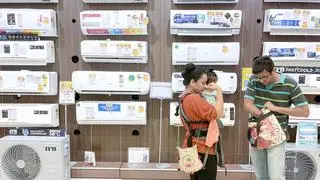Fuel price volatility — primarily gas price — has become a concern for ceramic and tiles maker, Orientbell Tiles. The volatility is expected to continue at least till the first half, spurring the company to explore “investing in new processes” that include low power consumption machinery and buying power from IEX (exchanges).
Gas consumption accounts for 30-35 per cent of the cost for ceramics and tile manufacturers. And in FY22, the company saw fuel costs move up by 50 per cent.
According to Aditya Gupta, CEO, Orientbell, the price rise trends that they saw in Q4 (Jan-Mar) have continued into April and May.
“We see the same escalation in our fuel costs. For example, in Morbi (Gujarat) gas prices have almost doubled in the last seven to eight months at ₹72 per cubic meters in April,” he told BusinessLine.
In a bid to protect margins, the company has been hiking prices by 3-5 per cent each quarter in FY22 for products made at its own factories, and 6-8 per cent in case of traded products. EBITDA stood at 9 per cent in FY22.
In Q4FY22, EBITDA improved to 12.5 per cent versus 10.8 per cent, y-o-y.
Average realisations increased from ₹239 per sq mtr to ₹266 per sq mtr, driven by price improvements coupled with improved product mix.
“We have been taking price increases, including one in the April to June quarter. We have also been able to achieve 3.5 per cent of savings by various cost cutting measures in the factories and by changing some of the raw materials and power sources. So, I think the sense is the current gas cost is what we are seeing in this quarter, we have taken price increases to cover that,” Gupta said.
Explaining the cost saving measures, Gupta said, the moment open access was allowed in Uttar Pradesh, the company started trading IEX. The power mixes — trading in solar combined — is now 44 per cent versus previous 15 per cent; with the savings reflecting in the bottom line.
At the same time, Orientbell has been able to sustain the price hikes, primarily because smaller and unorganised players — especially from Morbi, which is considered to be the ceramic and tiles manufacturing hub — have been struggling. A steep increase in gas prices by Gujarat Gas have strained their working capital calculations too.
“I think Morbi has been down, we have seen various shutdowns in Q4. And also, in April a significant number of units continue to stay shut down. So, this is all to the benefit of organised players,” he explained.








Comments
Comments have to be in English, and in full sentences. They cannot be abusive or personal. Please abide by our community guidelines for posting your comments.
We have migrated to a new commenting platform. If you are already a registered user of TheHindu Businessline and logged in, you may continue to engage with our articles. If you do not have an account please register and login to post comments. Users can access their older comments by logging into their accounts on Vuukle.